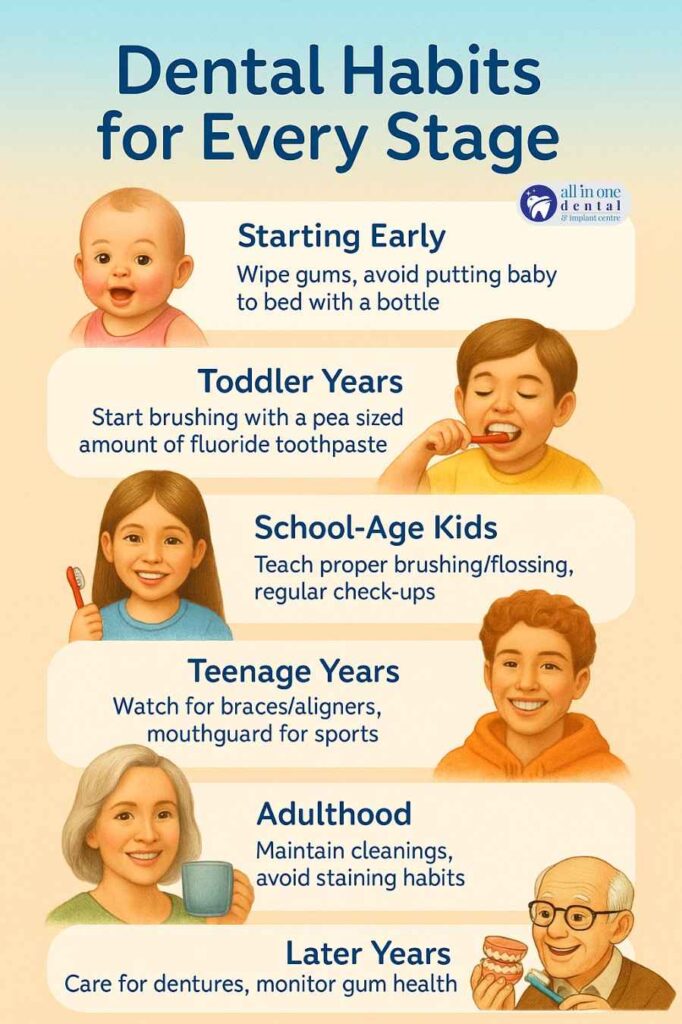
Starting Early: The First Tooth and First Visit
Your child’s dental journey starts earlier than you might think. As soon as the first baby tooth emerges, usually around 6 months of age, it’s time to start brushing gently. The first visit to the dentist is recommended by the age of one.
This first milestone is not just about checking teeth, but about educating parents on cleaning routines, dietary tips, and teething care. Early visits can also help reduce the risk of early childhood cavities and get children used to the dental environment.
Toddler Years: Building the Brushing Habit
From ages 2 to 5, children grow most of their baby teeth. This is the perfect time to establish brushing routines twice daily with a small, pea-sized amount of fluoride toothpaste. At this stage, regular dental check-ups every six months become important to catch any issues early.
Another key milestone is introducing flossing as soon as two teeth touch. Early flossing helps prevent decay between teeth, a common problem in toddlers.
School-Age Kids: Monitoring Growth and Bite Development
When children start school, between ages 6 and 12, a lot happens in their mouths. They begin to lose baby teeth and their adult teeth start appearing. This is a critical phase to monitor bite alignment and jaw development.
Your child’s dentist may recommend orthodontic assessments around age 7 to identify any early signs of misalignment. Continuing regular dental visits and reinforcing healthy brushing and flossing habits are crucial during these years. Parents should also pay attention to dietary habits, encouraging low-sugar, tooth-friendly snacks.
Teenage Years: Protecting the Smile Through Growth
Teenagers experience a second wave of dental changes. Wisdom teeth may begin developing, and orthodontic treatments like braces or aligners often happen during this period. Regular dental visits help monitor wisdom teeth and overall oral health, especially with the increased risk of cavities during adolescence.
Good dental hygiene becomes even more important in teens to prevent gum disease, plaque build-up, and enamel erosion—especially with changing diets and busy lifestyles. Encourage mouthguards during sports activities to protect their smile from injuries.
Adulthood: Maintaining a Healthy Routine
Adulthood doesn’t mean the end of dental milestones. Instead, it’s about maintaining a solid routine of twice-daily brushing, daily flossing, and dental visits every six months. Adults should be aware of gum health, sensitivity issues, and the potential need for treatments like fillings, crowns, or even implants.
Pregnancy is another crucial milestone for women. Hormonal changes can affect gum health, making prenatal dental check-ups important to prevent pregnancy-related gum disease.
Later Years: Supporting Senior Oral Health
Oral health continues to be essential as we age. Older adults often experience challenges like dry mouth, tooth loss, and gum recession. Regular dental visits help manage these concerns, ensuring a healthy and functional smile in senior years.
Dentists may suggest solutions like dentures, implants, or bridges, depending on individual needs. Seniors should also monitor any medication side effects that may impact oral health.
Why Tracking S-Milestones Matters
Following the S-Milestones checklist ensures timely intervention, prevents dental problems, and promotes lifelong healthy habits. From the first tooth to the golden years, each stage builds the foundation for better health and confidence.
Oral health affects more than just your smile—it influences nutrition, speech, self-esteem, and overall wellbeing. That’s why being proactive with dental milestones leads to healthier families and fewer dental complications.
Final Thoughts
Good oral health doesn’t happen by accident. It’s built step by step, milestone by milestone. Dental Health Week 2025 encourages parents and individuals to understand, track, and celebrate these important dental moments. Whether it’s your child’s first tooth or your own regular check-up, every dental milestone deserves attention.
Start now, stay consistent, and protect your smile at every stage of life.
To know more about preventive dental care and milestone check-ups, visit www.allinonedental.com.au.
